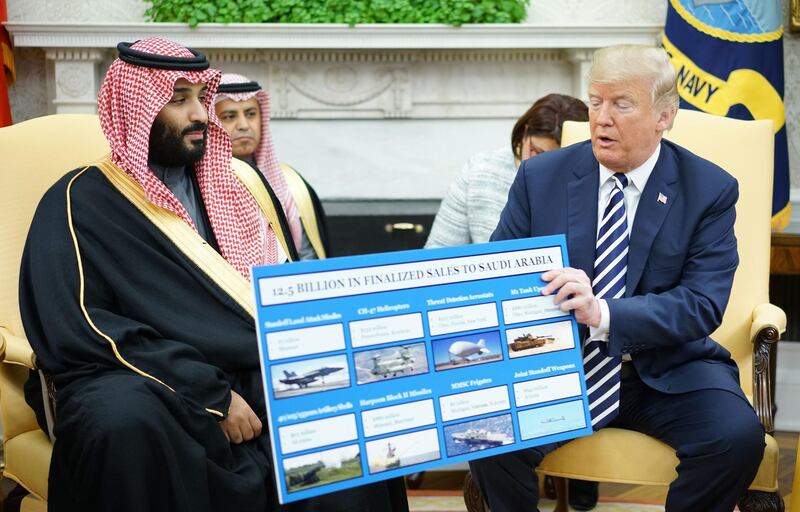The high profile visit by Saudi Arabia's Crown Prince Mohammed bin Salman to the US has all the potential to become a defining moment in the development of the modern Middle East, one whose impact on the region's landscape will be felt for many years to come.
To date, most of the attention relating to the Crown Prince's visit, which began with him meeting US president Donald Trump at the White House earlier this week, has focused on the likely implications for the future of US-Saudi relations.
But when I interviewed the Crown Prince in Riyadh earlier this month, he made it clear that his ambitions lay far beyond securing Saudi Arabia's own radical reform programme.
The 32-year-old heir to the Saudi throne believes the dramatic changes he is overseeing in Saudi Arabia will also have a beneficial impact on the rest of the Arab world, both in terms of driving economic prosperity and improving regional security.
“Because of our dominant position, Saudi Arabia is the key to the economic success of the region,” the Crown Prince told me. “We believe that Saudi Arabia needs to be part of the global economy. People need to be able to move freely, and we need to apply the same standards as the rest of the world.”
This is the message the Crown Prince will be delivering to American business leaders on his 20-day tour of the US, during which he plans to visit seven cities and explain the lucrative trade opportunities his country’s Vision 2030 economic development programme have to offer.
The visit certainly got off to a good start, with Mr Trump remarking on the current state of US-Saudi ties, “The relationship is probably the strongest it’s ever been. We understand each other. Saudi Arabia is a very wealthy nation, and they’re going to give the United States some of that wealth hopefully, in the form of jobs, in the form of the purchase of the finest military equipment anywhere in the world.”
For his part, the Crown Prince, speaking in English, reminded his audience that the Kingdom was “the oldest ally of America in the Middle East”.
One of the main aims of the visit will be to deepen trade ties with the US, with the Crown Prince saying that the relationship, which is currently worth around $200 billion in investments, could rise in future years, thereby helping to generate millions of jobs in both countries. To drive home how seriously the Crown Prince is taking his trade initiative he has brought with him a large delegation representing the ministries of energy, commerce and trade who will travel with him during his coast-to-coast tour, where, apart from Washington, he will visit Boston, New York, Seattle, San Francisco, Los Angeles and Houston.
One of the visit's highlights for the Crown Prince, who frequently talks of his admiration for Steve Jobs, the founder of Apple Inc., will be his visit to Silicon Valley, where he will meet the heads of tech giants such as Apple and Google, all part of his plan to place Saudi at the forefront of technological innovation in the Middle East.
_______________
Read more from Opinion
[ A time of growing confidence for the Commonwealth network of countries ]
[ A strong art scene is a crucial component of a global city. Dubai doesn't disappoint ]
[ Am I a supermum? Heck yes. Do I want to be? Not really ]
_______________
The other, equally important dimension to the visit, though, will be to strengthen ties in the fields of defence and security cooperation. The importance of this relationship was emphasised by Mr Trump during his White House meeting with the Crown Prince, where the president produced a placard illustrating the current level of US military sales to the Kingdom, which currently stands at around $12.5 billion, a figure that could rise substantially in future years.
But as Dr Anwar Gargash, the UAE's Minister of State for Foreign Affairs, pointed out on the eve of the Crown Prince's visit, cooperation between the Saudis and the US on defence and security issues is about much more than negotiating lucrative arms deals.
With the the threat posed by Iran’s aggressive stance towards its Arab neighbours, as well as the continuing controversy over its nuclear ambitions, likely to top the security agenda, Dr Gargash believes Saudi leadership is vital to maintaining regional stability.
“In a region torn by regional interventions, the Arabs’ political weight is returning with a strength through the Crown Prince’s presence and Saudi Arabia’s position,” he said.
The fact that the Crown Prince chose to highlight the Iran issue during his interview with CBS's 60 Minutes programme, where he warned Saudi would seek nuclear weapons if Iran developed its own capability, will not have been lost on his American hosts.
The Trump administration is currently in the process of undertaking a thorough review of the nuclear deal negotiated with Iran by former US President Barack Obama and other leading world powers. The Obama administration was no friend of the Saudis, constantly criticising Riyadh over its human rights record and demonstrating a preference for dealing with Tehran.
With Mr Trump now occupying the White House, that attitude has been reversed, and the inclination among key advisers such as Gen H R McMaster, the National Security Adviser, is to take a more robust approach with Iran. There is now a growing expectation in Washington that the Trump administration will walk away from the nuclear deal later this year, using Iran’s continued development of its ballistic missile programme and its unwanted meddling in the affairs of Arabs states as an excuse.
This would certainly be welcome news for the Saudis and its Gulf allies, as it would send a clear signal that Riyadh, not Tehran, was the focus of Washington’s key strategic interests in the Middle East.
Con Coughlin is the Daily Telegraph’s Defence and Foreign Affairs Editor





